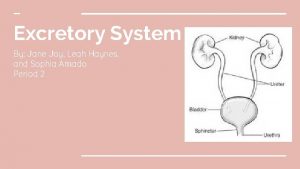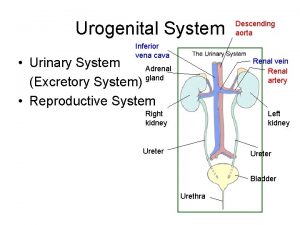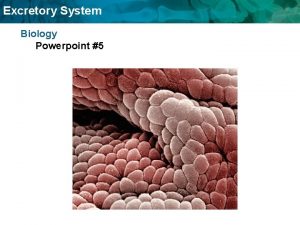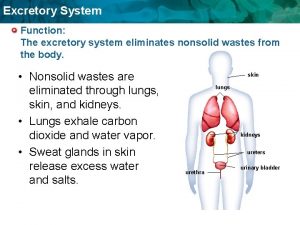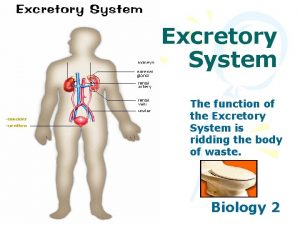The Excretory System The function of the excretory













- Slides: 13

The Excretory System

The function of the excretory system is to maintain HOMEOSTASIS • Homeostasis: is the maintenance of the body’s internal balance of minerals, fluids, gases and temperature.

The Organs of the Excretory System • Lungs • Kidney • Liver • Skin

Lung Excretion increased body activity Increase in respiration rate DECREASED CO 2 in blood increased cellular metabolism CO 2 detected by nerves in brain (medulla oblongata) Increased CO 2 production increased CO 2 in blood

Function of Kidneys • Remove wastes and excess substances (e. g. sugar) from blood and excrete them into the ureters. • Return purified blood to the renal vein • Regulate the water and mineral content of the blood

• Ureters carry urine from kidneys to the bladder • Urine is collected in the bladder, resembles an expandable bag • Urine excrete from bladder via the urethra


capillaries glomerulus Bowman’s glomerulus minerals glucose water Bowman’s Red blood cells White blood cells proteins urea Renal tubula water urine salts water urea veins

Kidney Failure • Can be brought on by an infection (temporary) • Or because nephrons are destroyed (permanent) • Person may require dialysis, a blood purification technique done by a machine that takes several hours

Functions of the Liver • break down of insulin and other hormones • breaks down haemoglobin, creating metabolites that are added to bile as pigment (bilirubin and biliverdin). • breaks down toxic substances and most medicinal products - sometimes results in toxication, when the metabolite(end product) is more toxic than its precursor (what start with). • converts ammonia to urea. • produces and excretes bile

Function of the Skin Heat regulation: Dilated blood vessels increase blood flow to surface and heat loss (e. g. flushed face when hot) constricted vessels reduce blood flow and conserve heat. (e. g. bluish lips when cold) sweat contains a small amount of urea excretion by sweating is at most a secondary function to temperature regulation.

Any Questions?

 Major functions of the excretory system
Major functions of the excretory system What is the main function of the excretory system
What is the main function of the excretory system Inferior vena cava urinary system
Inferior vena cava urinary system Lungs excretory function
Lungs excretory function Non excretory function of kidney
Non excretory function of kidney The mammalian excretory system
The mammalian excretory system Unsegmented roundworms
Unsegmented roundworms What does the excretory system do
What does the excretory system do The excretory organs
The excretory organs 5 facts about the excretory system
5 facts about the excretory system Section 38-3 the excretory system
Section 38-3 the excretory system Juxtaposing in earthworm
Juxtaposing in earthworm Section 38-1 food and nutrition
Section 38-1 food and nutrition Fetal pig diagram labeled answers
Fetal pig diagram labeled answers

